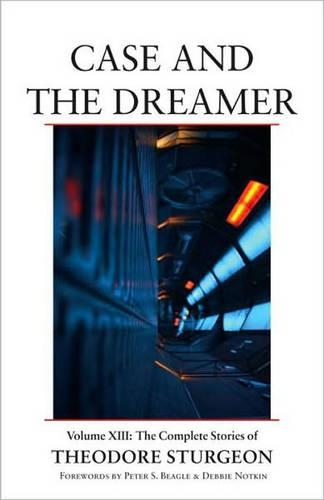
Case and the Dreamer: Volume XIII: The Complete Stories of Theodore Sturgeon
(Hardback)
Publishing Details
Case and the Dreamer: Volume XIII: The Complete Stories of Theodore Sturgeon
By (Author) Theodore Sturgeon
Edited by Noel Sturgeon
Foreword by Peter S. Beagle
Foreword by Debbie Notkin
Afterword by Paul Williams
13
North Atlantic Books,U.S.
North Atlantic Books,U.S.
15th July 2011
10th September 2010
United States
Classifications
General
Fiction
813.54
Physical Properties
Hardback
400
Width 160mm, Height 234mm, Spine 33mm
743g
Description
James Blish called him the "finest conscious artist science fiction ever produced." Kurt Vonnegut based the famous character Kilgore Trout on him. And such luminaries as Harlan Ellison, Stephen King, and Octavia Butler have hailed him as a mentor. Theodore Sturgeon was both a popular favorite and a writer's writer, carving out a singular place in the literary landscape based on his masterful wordplay, conceptual daring, and narrative drive. Sturgeon's sardonic sensibility and his skill at interweaving important social issues such as sex-including gay themes-and war into his stories are evident in all of his work, regardless of genre. Case and the Dreamer displays Sturgeon's gifts at their peak. The book brings together his last stories, written between 1972 and 1983. They include "The Country of Afterward," a sexually explicit story Sturgeon had been unable to write earlier in his career, and the title story, about an encounter with a transpatial being that is also a meditation on love. Several previously unpublished stories are included, as well as his final one, "Grizzly," a poignant take on the lung disease that killed him two years later. Noted critic and anthologist Paul Williams contextualizes Sturgeon as both man and artist in an illuminating afterword, and the book includes an index to the stories in all thirteen volumes.
Reviews
"Sturgeon wrote miraculous short stories ... Sturgeon found his urgency directed in becoming the John Dos Passos, the William Faulkner, the Ring Lardner, the James Thurber, the Virginia Woolf of science fiction."
Jonathan Lethem
"A terrific writer; I enjoyed every word he published."
Robert Heinlein
"One of the best writers in America ... Sturgeon is a master storyteller certain to fascinate all sorts of readers, not only science fiction fans."
Kurt Vonnegut
"Sturgeon's stories have an emotional impact unmatched by almost any other writer."
Arthur C. Clarke
"Sturgeon's often tender explorations of alien minds were as carefully worked out as Faulkner's exploration of the mind of the idiot in The Sound and the Fury. His emphasis on psychology instead of blasters prepared the way for most modern masters of the science fiction genre."
Stephen King
"Sturgeon wrote with power, range, vividness, fierce insight, and above all, with a fine prose style. I turn to him expecting to find all the pleasures of literature, and he never disappoints."
Michael Chabon, bestselling author of The Amazing Adventures of Kavalier and Clay
Author Bio
Theodore Sturgeon (1918-1985), one of the most influential writers of the Golden Age of science fiction, is ranked with classic contemporaries such as Isaac Asimov, Robert Heinlein, Ray Bradbury, and Arthur C. Clarke. He received the International Fantasy Award for his novel More Than Human, which has been continuously in print since 1953, but he is primarily known for his short stories. Sturgeon received both the Hugo and Nebula awards for his story "Slow Sculpture" and was posthumously inducted into the Science Fiction Hall of Fame. Sturgeon wrote several Star Trek episodes, one of which introduced the famous Vulcan hand greeting and the phrase "Live long and prosper." James Blish wrote that Sturgeon was the "finest conscious artist science fiction ever produced." Sturgeon was a model for his friend Kurt Vonnegut's memorable character Kilgore Trout, and his work was an acknowledged influence on important younger writers such as Harlan Ellison, Robert Silverberg, Brian W. Aldiss, Stephen King, Octavia Butler, and Jonathan Lethem, many of whom have written introductions for previous volumes of The Complete Stories of Theodore Sturgeon.
